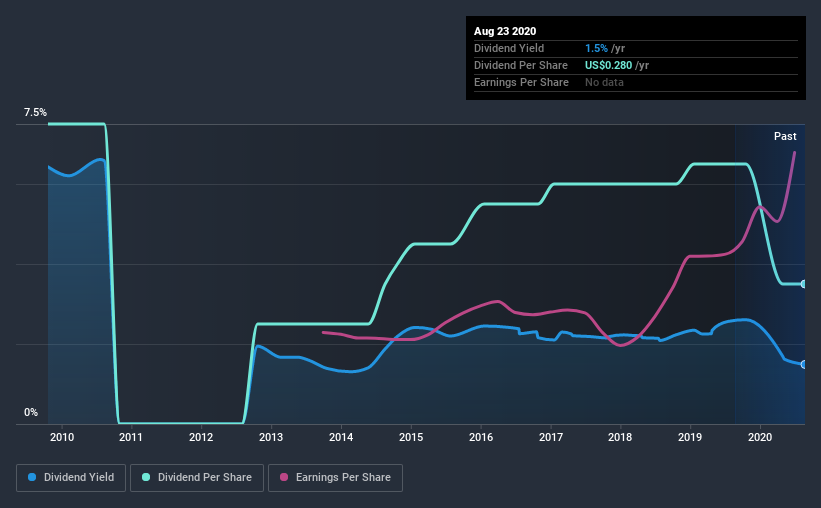Should You Buy United Bancshares, Inc. (NASDAQ:UBOH) For Its Upcoming Dividend?

Some investors rely on dividends for growing their wealth, and if you're one of those dividend sleuths, you might be intrigued to know that United Bancshares, Inc. (NASDAQ:UBOH) is about to go ex-dividend in just four days. Ex-dividend means that investors that purchase the stock on or after the 28th of August will not receive this dividend, which will be paid on the 15th of September.
United Bancshares's next dividend payment will be US$0.14 per share, and in the last 12 months, the company paid a total of US$0.28 per share. Calculating the last year's worth of payments shows that United Bancshares has a trailing yield of 1.5% on the current share price of $18.8. Dividends are an important source of income to many shareholders, but the health of the business is crucial to maintaining those dividends. So we need to investigate whether United Bancshares can afford its dividend, and if the dividend could grow.
Check out our latest analysis for United Bancshares
Dividends are usually paid out of company profits, so if a company pays out more than it earned then its dividend is usually at greater risk of being cut. United Bancshares paid out just 12% of its profit last year, which we think is conservatively low and leaves plenty of margin for unexpected circumstances. United Bancshares paid a dividend despite reporting negative free cash flow over the last twelve months. This may be due to heavy investment in the business, but this is still suboptimal from a dividend sustainability perspective.
When a company paid out less in dividends than it earned in profit, this generally suggests its dividend is affordable. The lower the % of its profit that it pays out, the greater the margin of safety for the dividend if the business enters a downturn.
Click here to see how much of its profit United Bancshares paid out over the last 12 months.
Have Earnings And Dividends Been Growing?
Stocks in companies that generate sustainable earnings growth often make the best dividend prospects, as it is easier to lift the dividend when earnings are rising. Investors love dividends, so if earnings fall and the dividend is reduced, expect a stock to be sold off heavily at the same time. It's encouraging to see United Bancshares has grown its earnings rapidly, up 26% a year for the past five years.
Many investors will assess a company's dividend performance by evaluating how much the dividend payments have changed over time. United Bancshares has seen its dividend decline 7.3% per annum on average over the past 10 years, which is not great to see. United Bancshares is a rare case where dividends have been decreasing at the same time as earnings per share have been improving. It's unusual to see, and could point to unstable conditions in the core business, or more rarely an intensified focus on reinvesting profits.
The Bottom Line
Is United Bancshares an attractive dividend stock, or better left on the shelf? When companies are growing rapidly and retaining a majority of the profits within the business, it's usually a sign that reinvesting earnings creates more value than paying dividends to shareholders. Perhaps even more importantly - this can sometimes signal management is focused on the long term future of the business. United Bancshares ticks a lot of boxes for us from a dividend perspective, and we think these characteristics should mark the company as deserving of further attention.
While it's tempting to invest in United Bancshares for the dividends alone, you should always be mindful of the risks involved. Every company has risks, and we've spotted 1 warning sign for United Bancshares you should know about.
We wouldn't recommend just buying the first dividend stock you see, though. Here's a list of interesting dividend stocks with a greater than 2% yield and an upcoming dividend.
This article by Simply Wall St is general in nature. It does not constitute a recommendation to buy or sell any stock, and does not take account of your objectives, or your financial situation. We aim to bring you long-term focused analysis driven by fundamental data. Note that our analysis may not factor in the latest price-sensitive company announcements or qualitative material. Simply Wall St has no position in any stocks mentioned.
Have feedback on this article? Concerned about the content? Get in touch with us directly. Alternatively, email editorial-team@simplywallst.com.

